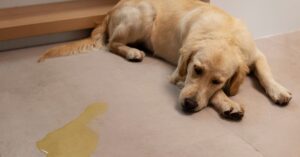Irritated anus in dogs is a common issue that many pet owners face, but it can be uncomfortable and worrying for both you and your furry friend. Dogs experience irritation for a variety of reasons, ranging from anal gland problems to allergies. In this article, we’ll explore the causes of this condition, how to soothe it, and when to seek veterinary help. If your dog is suffering from this discomfort, don’t worry—there are many steps you can take to help.
What Causes Anal Irritation in Dogs?
Before diving into remedies, it’s important to understand the underlying causes of anal irritation in dogs. Here are some common causes that can lead to discomfort in your dog’s bottom:
Anal Gland Problems
Anal gland issues in dogs occur when the glands located near the anus become impacted, infected, or abscessed. This can lead to discomfort, excessive licking, scooting, or a foul odor. In some cases, the glands may need to be expressed manually by a vet to prevent further problems. Left untreated, infected anal glands can cause significant pain and health complications, requiring veterinary attention.
Parasites
Intestinal parasites, such as worms, can cause irritation around a dog’s anus. These parasites may lead to symptoms like itching, scooting, and excessive licking. Dogs can become infected with parasites through contaminated food, water, or contact with other infected animals. If left untreated, parasites can cause discomfort, digestive issues, and more serious health problems. Regular deworming and flea control are essential for preventing parasite infestations in Korean Corn Dog.
Allergies
Dogs can develop allergies to certain foods, environmental factors, or flea bites, which can lead to skin irritation, including around the anus. Allergic reactions often cause itching, redness, and discomfort. In some cases, food allergies or sensitivities can result in digestive issues that affect the anal area. Managing allergies involves identifying triggers, avoiding allergens, and sometimes using antihistamines or prescribed treatments to reduce symptoms and prevent irritation.
Infections
Infections around a dog’s anus can result from bacteria, yeast, or fungi. These infections often cause redness, swelling, discharge, and discomfort. Infected anal glands, skin abrasions, or untreated wounds can lead to such conditions. Symptoms may include foul odor and excessive licking. If left untreated, infections can worsen, leading to abscesses or more severe complications. Prompt veterinary care, including antibiotics or antifungal treatments, is crucial for healing.
Poor Hygiene
Fecal Impaction
Fecal impaction occurs when a dog’s stool becomes hard and difficult to pass, often leading to discomfort around the anus. This condition can cause straining, irritation, and sometimes swelling. Impaction can result from dehydration, poor diet, or underlying health issues. If left untreated, it can lead to more severe complications. To prevent impaction, ensure your dog has a balanced diet, plenty of water, and regular exercise.
How to Soothe Dog Irritated Anus: Simple Home Remedies
Now that we know the causes, here are some remedies you can try at home to soothe your dog’s irritated anus:
1. Gentle Cleaning
2. Warm Compress
Applying a warm compress to the irritated area can help reduce swelling and pain. Simply soak a clean towel in warm water, wring it out, and hold it against the affected area for a few minutes. This method is especially helpful if there’s inflammation or if your dog’s anal glands are impacted.
3. Topical Ointments
Topical ointments are used to soothe irritation and inflammation around a dog’s anus. These ointments often contain soothing ingredients like aloe vera, calendula, or witch hazel, which can help reduce redness and discomfort. Pet-safe ointments provide a protective barrier, promoting healing while keeping the area moisturized. Always choose an ointment designed specifically for pets to avoid irritation from harmful chemicals or fragrances. Apply as directed for best results.
4. Increase Fiber Intake
Increasing fiber in your dog’s diet can help prevent anal irritation caused by constipation or hard stools. Fiber softens the stool, making it easier to pass and reducing strain during bowel movements. This can alleviate discomfort around the anus and prevent issues like fecal impaction. Adding high-fiber foods or supplements to your dog’s meals can promote healthy digestion and support overall bowel health for long-term comfort New York.
5. Sitz Baths for Dogs
A sitz bath can help soothe and clean a dog’s irritated anus. By filling a small tub with warm water, your dog can sit comfortably to relieve discomfort and reduce swelling. This method is particularly effective for dogs with anal gland issues or inflammation. A sitz bath promotes relaxation, helps remove debris, and speeds up the healing process. Ensure the water is not too hot for your dog’s comfort.
When to Seek Veterinary Help
In some cases, home remedies might not be enough. If your dog’s irritation persists or worsens, it’s important to take them to the vet for a proper diagnosis. Here are signs that you should seek professional help:
-
Persistent or Severe Discomfort: If your dog is constantly licking, scooting, or seems in significant pain, it’s time to consult a vet.
-
Signs of Infection: If you notice pus, swelling, or a foul odor, there may be an infection requiring antibiotics.
-
Blood in the Stool or Around the Anus: Blood can indicate a more serious condition, such as anal gland problems or parasites.
-
Lack of Improvement: If your dog’s condition isn’t improving after a few days of home treatment, a vet visit is essential.
How to Prevent Anal Irritation in Dogs
Prevention is key when it comes to keeping your dog’s bottom comfortable. Here are a few tips to help reduce the risk of anal irritation in the future:
-
Regular Grooming: Regularly check and clean the area around your dog’s anus to prevent fecal matter from causing irritation.
-
Dietary Changes: Ensure your dog’s diet is balanced with adequate fiber to prevent constipation and anal gland issues.
-
Routine Vet Checkups: Regular veterinary checkups can help catch issues early, such as impacted anal glands or parasites, before they lead to more serious problems.
-
Flea and Parasite Control: Keep your dog on a regular flea and parasite prevention program.
FAQs
Q: How can I tell if my dog’s anus is irritated?
A: Signs of irritation include excessive licking, scooting, redness, swelling, or discomfort when your dog is sitting.
Q: Can I use human wipes to clean my dog’s irritated anus?
A: It’s best to use pet-safe wipes, as human wipes often contain fragrances and chemicals that may irritate your dog’s sensitive skin.
Q: What can I do if my dog is scooting on the carpet?
A: Scooting is a common sign of anal irritation. Clean the area gently, apply a warm compress, and consider consulting a vet for a more serious issue.
Q: Can anal irritation in dogs go away on its own?
A: Minor irritation might resolve with proper cleaning and care. However, if symptoms persist or worsen, you should visit the vet.
Q: How often should I check my dog’s anal glands?
A: Regular grooming sessions and vet checkups should help prevent anal gland issues. However, if your dog is showing signs of discomfort, check more frequently.
Conclusion
Taking care of your dog’s health is essential, and anal irritation is a common issue that can be easily managed with the right approach. By following the steps mentioned above, you can help soothe your dog’s irritated anus and improve their comfort. However, always consult a veterinarian if the condition persists or worsens. Prevention is also important, so keep your dog’s diet, hygiene, and overall health in check to avoid recurring problems.




